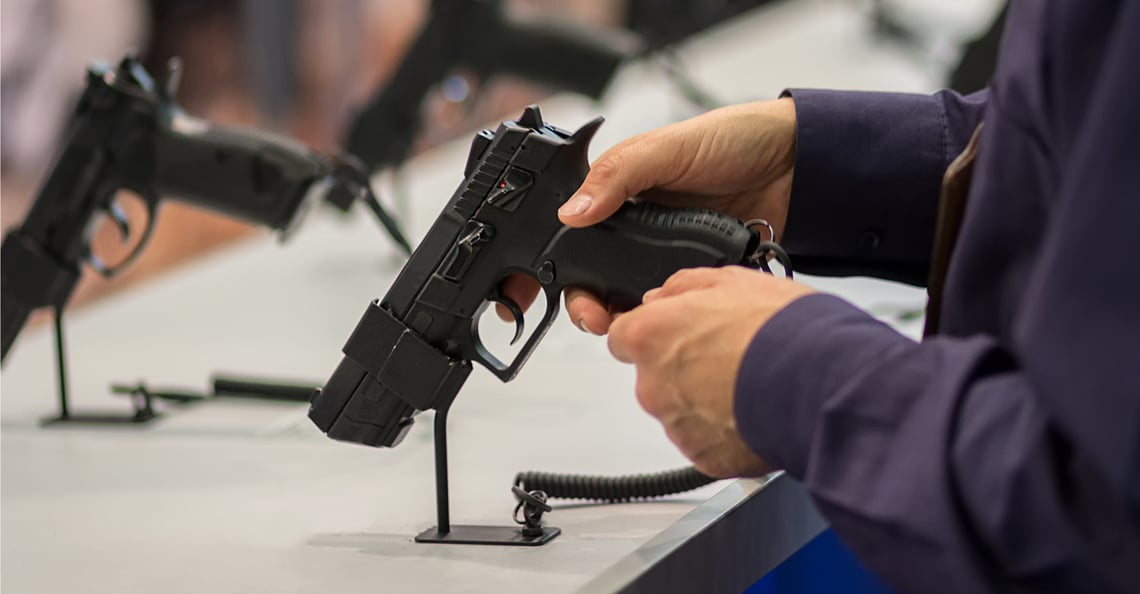The Federal Bureau of Investigation has removed more than 500,000 records identifying people with outstanding criminal arrest warrants from a database of prohibited gun purchasers, following a Department of Justice ruling last month that sought to settle an interagency dispute over who qualifies as a “fugitive.”
The records were deleted from the National Criminal Background Check System (NICS) Index, a point-of-sale instant-check database that includes about 16 million records of people who authorities have determined are not legally allowed to own firearms. The removal of the records came with new standards that raise the bar for qualifying as a fugitive, requiring that persons knowingly flee an open warrant across state lines before a gun ban kicks in.
The DOJ order does not necessarily mean that all of the more than 500,000 people deleted from NICS can now go out and legally purchase a gun. Federal investigators check would-be gun buyers against three different databases in order to prevent sales to convicted felons and other people who are barred by statute from owning firearms, and some of the removed names — it is not clear how many — also appear in one of the other databases, and could trigger a rejection.
But even though some of the records that used to be in the NICS Index exist elsewhere in the background check system, the changes could slow the process of flagging individuals with outstanding warrants, allowing some sales to go through.
Law enforcement experts say that the upshot of the changes, which came over the objections of the FBI, is clear: more people with outstanding arrest warrants for serious crimes will be given a green light to buy a gun, should they try to do so.
“It puts the public’s safety at risk when someone who is under felony charges is free to access a tool of violence and coercion,” said Anthony Coulson, a former special agent with the Drug Enforcement Administration and an expert on the background check system.
The changes to the background check system are the result of a Justice Department ruling that significantly narrows the definition of “fugitive from justice,” a vaguely defined category of would-be purchasers who, under federal law, cannot legally buy a gun. Prior to February, everyone with an open warrant who had been entered in the FBI’s NICS Index and tried to buy a firearm was flagged for further review.
The new rule defines fugitives as only those people who have fled a state to avoid prosecution, and are wanted for “imminent” criminal prosecution or testimony.
When the FBI performs a background check, it queries three databases: The NICS Index, which includes records contributed by federal and state agencies identifying individuals prohibited from buying a gun, for reasons ranging from criminal history to severe mental illness; the Interstate Identification Index, a database of criminal histories; and the National Crime Information Center, or NCIC, an “electronic clearinghouse” of criminal records, which also includes records of outstanding warrants.
From November 1998 to February 2017, the FBI denied more than 175,000 transactions because the would-be purchaser had an outstanding warrant — second only to the total barred by convictions for felonies or serious misdemeanors. According to an audit last fall by the FBI’s Office of the Inspector General, the Bureau of Alcohol, Tobacco, Firearms and Explosives disagreed with about one third of those rejections.
The ATF argued that language in the Brady Act — the 1993 law that created the federal background check system — clearly stated that “fugitives” are people with arrest warrants who have fled across state lines. The FBI, which runs the background check system, had adopted the broader definition, blocking sales to anyone with an outstanding arrest warrant.
Under federal law, the FBI has three business days to complete a gun background check, after which a sale can proceed even if the bureau’s vetting of the buyer remains incomplete. Over the years, thousands of firearms have been sold to persons with outstanding warrants who were eventually deemed by the FBI to be disqualified from gun ownership. When such sales happen, it becomes the job of the ATF to track those people down — but because the ATF disputed the FBI’s interpretation of the fugitive standard, it took no action in more than 2,000 such cases over a 15-year period ending in 2015.
On at least two occasions since 2008, the FBI has asked the Justice Department to settle the disagreement. Most recently, following the Inspector General’s audit that was released last September, the deputy assistant attorney general in the Office of Legal Counsel stated that the issue would be sorted out “within the next few months.”
Finally, on February 15, the Justice Department issued its ruling, siding with the ATF.
“Knowing how questions are examined by Office of Legal Counsel, it takes a long time to get a decision,” said Frank Campbell, who was one of the architects of the NICS while working as a senior Justice Department attorney in the 1990s. “It doesn’t happen in a matter of days.”
The ruling by the Justice Department to reclassify fugitives required a series of significant changes. According to a DOJ memo obtained by The Trace, department lawyers ordered the FBI to “immediately remove” all fugitive records from the NICS Index. Without specifying a timetable, the document also instructed the “NICS Index contributors” — the state and federal law enforcement agencies that provided the records — to evaluate the removed records and re-enter only those that fit the new fugitive criteria. Until that process is completed, no new open warrants may be entered into the NICS Index’s fugitive category.
A February 28 FBI document listing all active records in the NICS Index shows that the category description of “fugitive from justice” had been removed.
An FBI spokesman did not respond to questions about how long it will take to rebuild the NICS Index, instead providing a basic primer on how the background check system works. The agency referred additional questions to the Justice Department, which did not respond to multiple requests for comment.
Contact Us
Learn how to contact our reporters securely.
A special agent with the North Carolina State Bureau of Investigation said the FBI had not provided a deadline for re-evaluating entries based on the new criteria. A spokesman for the Massachusetts Department of Public Safety said that because the state has its own law barring anyone with an outstanding warrant from obtaining a firearms license, its records were re-entered into the NICS Index under the category of “state prohibitor.” The move was approved on February 16, the day after the DOJ issued the rule change.
The layers of records that the FBI uses to determine eligibility for firearms ownership were a patchwork even before the recent ruling. States forward records of persons prohibited by their mental health status, for instance, at notoriously uneven rates.
So it goes with records of open warrants. According to a Bureau of Justice Statistics report published in February, at the end of 2014 there were 7.8 million active-warrant records in state warrant databases, but only about 2.1 million warrant records in the federal NCIC database. More than 70 percent of the records in the state databases are not available to gun background check screeners or other federal law enforcement officers who rely on NCIC.
Only a handful of states take the step of reporting open warrants to the NICS Index, which is intended to provide the clearest indication that a person has been categorized as too high-risk to own firearms. Of the roughly 500,000 fugitive-from-justice records that were in the NICS Index as of January 1, some 430,000 were provided by Massachusetts.
A 2014 investigation by USA Today found that many people with outstanding criminal warrants, including for violent crimes, were able to purchase guns from licensed dealers. In one case, an Arkansas man facing charges for a shooting in a nightclub bought at least four guns without being flagged because his warrant was never entered into a federal database.
The new Justice Department rule likely means that an already incomplete background check system will now include even more omissions.
“It gets really dicey in terms of whether there will be a hit, now that they changed the definition,” said Coulson, the former DEA agent. “There have to be a lot of factors in place.”
Experts say that even if the records removed from the NICS Index also exist in the NCIC, making a determination on those individuals’ warrants — whether they are actively being sought, are aware they are wanted, and have crossed state lines — may take longer. While the NICS Index returned a determination on buyers flagged as possible fugitives within about an hour, sorting out what’s in a NCIC wanted persons record can take several days, said Robert McCrie, a professor of security management at John Jay College of Criminal Justice.
The new standard for fugitives raises the risk that it will take the FBI longer than the three-business-day limit to make a determination on a prospective buyer’s eligibility, increasing the number of transactions that move forward in what’s known as a “default proceed” sale.
“Hundreds or thousands of people over time will have a greater likelihood of getting permission to buy a weapon because the three day clearance wasn’t achieved,” McCrie said.
The FBI no longer routinely discloses how many default-proceed sales take place each year. The last time it released such a total was in 2000, when NICS issued more than 45,000.
Default-proceed sales have public safety implications: In April 2015, Dylann Roof legally obtained a .45-caliber Glock handgun after a NICS examiner was unable to access his disqualifying arrest record within three business days. Two months later, Roof went on to use that weapon to kill nine black parishioners in a Charleston, South Carolina, church.
Nor is it clear that a wanted person who remains in the state where he or she is under warrant poses less of a safety risk than one who flees across state lines. While Coulson agreed that the Justice Department is interpreting the federal fugitive statute as it is written, he believes the sentiment is outdated. If law enforcement is looking for people and can’t find them, he argues, they should be considered fugitives. The same 2014 USA Today investigation, looking at law enforcement data from just three states, found nearly 1 million persons with open warrants — include some sought for rape or murder — who escaped arrest simply by crossing into another county.
McCrie said he is also concerned that police officers charged with executing outstanding warrants in such cases may now face increased danger of a violent confrontation.
“When a person has a warrant out for him, his emotions can be very intense,” McCrie said. “If now they have a right to buy a weapon, there may be some who will make the bad decision to use that weapon when the police officer comes to take him into custody.”

